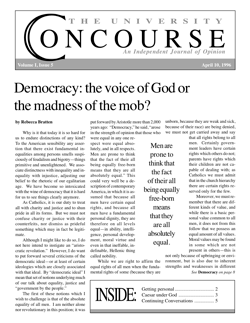Rock music
by Cynthia and Michael Welker
We are among those who agree with Mark Fischer’s arguments against a total rejection of rock music on the basis of its cultural antecedents.
Mr. Minto has argued that rock music is essentially and destructively escapist. We disagree. It seems to us (1) that the range of personal experiences in rock music is not limited to the “negative” or the escapist; (2) that the themes Minto considers so destructive are also present in many other genres; (3) that escapes need not be bad.
According to Minto, rock music offers false “patchwork” solutions to our deep inner needs, enticing us into its aimless sexual beats, which gratify emotional cravings by an elusive, temporary “fix,” leaving us, in the end, worse off than we were—like the drug addict. We agree that this is often the case, but we question whether it is always true of the rock genre. Are there not numerous examples of rock artists and songs whose basic thrust is entirely different? Consider the song “All Good People” by Yes or “Gloria” by U2 and “Kyrie Eleison” by Mr. Mister.
Secondly, we believe many musical genres (besides rock) reveal instances of particular pieces which are escapist in the sense just described. Witness the Marcia Funebre of Beethoven’s Eroica Symphony, the Scriabin Etude op. 42, no. 5, the third movement of Brahms’s Third Symphony, Mozart’s Adagio and Fugue in C Minor, K. 546, and the opening of Mahler’s Second Symphony. These works evoke intense grief, unrequited passion, sobbing melancholy, tragic resolve and angry despair. The listener “escapes” into these beautiful works of art, subjecting himself to sometimes violent emotional upheavals. Should this music also be rejected as antithetical to Christianity?
Or think of the tradition of tragedy in the dramatic arts. Here we witness ostensibly painful emotions and poignant human acts, and often cannot help entering into the world presented on the stage. We notice that persons often appreciate, seek out and relish such musical and dramatic experiences. Why? Is it due only to a sense of alienation and loss rooted in existential despair? Or is not some authentic human value realized through such experiences?
Among many observations made on the issue of human responses to art, Aristotle’s notion of “catharsis” is relevant to our discussion. The virtue of a cathartic response to music (or other fine art) is its controlled purging of certain real griefs, despairs, and other negative feelings. This “positive” use of “negative” emotions has been acknowledged through centuries of human experience. Is it not conceivable that at least some rock music serves this legitimate cathartic function?
Lastly, it seems to us that some forms of escape can be perfectly healthy. Fischer’s interesting example near the end of his response to Minto, wherein we are invited to put on our slickers and sing in the rain with Gene Kelly, is a case in point. Someone who has a “playful” or “happy” response in this context need not fear this escape or exuberant behavior represents a persisting pattern. Likewise, feelings of loss and despair, as well as joy, may be thought of in the music-context as emotional samplings—somewhat like wine samplings. They are limited in duration, isolated and often without real-life background. They are perhaps artificial, but they are not necessarily addictive and destructive escapes.
Cynthia and Michael Welker, SFO
Cynthia (Menk) Welker is an alumna of the class of ‘91. Michael Welker (‘89) is an
< Assistant Professor of economics at FUS.


